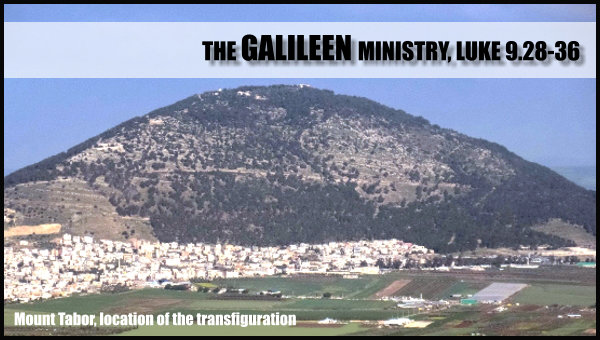By Tyson Thorne

The Galilean Ministry at Various Cities (4.14-9.50), 9.28-36
A little over a week after Jesus disclosed his identity to the disciples and warned them of the coming sufferings, he took Peter, James and John up a mountain to pray. Jesus promised his disciples that some of them would not die before seeing the kingdom, and some believe this passage delivers on that promise. The four of them were praying when the appearance of Jesus’ face “transformed”. His face and clothes shone brightly like a flash of lightening. Admittedly it sounds like something from the X-Files more so than the Bible, though there is one other similar reference…
Literary Note: Mark tells us that the events in this passage occurred six days later, rather than eight. Some critics point to this as a contradiction, but there is an easy explanation. Mark does not count the day Jesus spoke to them of the cost of discipleship or the day the transfiguration took place, so it was “six days later”. Luke includes both these days which is why he says “about eight days later”.
It is reminiscent of Moses and the righteousness that caused his face to glow after spending time with God on another mountain (Exodus 34). True righteousness changes a person’s appearance even as it did with Moses and again here. The disciples received brief glimpse of Jesus’ true glory, greater than Moses’ to be sure, as the Son of God. As unexpected as this change must have been, greater still was the sudden appearance of two men, the aforementioned Moses and Elijah. Ever wonder why it was these two? Some have suggested it has to do with their bodies. Moses’ body was secreted away by God, and Elijah was taken to heaven before he died. But I think there is a less mysterious and more practical reason. Together, these two men represent the beginning of Israel (Moses receiving the Law) and the end (Elijah, who is destined to return at the end of days).
So the three of them, Jesus, Moses and Elijah began to talk about Jesus’ departure – meaning his return to heavenly glory. Poetically, the English word translated “departure” is the Greek word exodon, or “exodus”. Luke was a clever writer. There is an important lesson to be learned in this conversation: Even Jesus had to suffer before entering glory and like Jesus there is no suffering we endure in this life that is greater than the glory we will receive.
In the meantime, the other three, Peter, James and John, were in a sleepy stupor (literally “weighed down with sleep”; it seems the disciples were always lulled by prayer as we’ll see again in 22.45). As Moses and Elijah were taking their leave Peter asked if he should prepare accommodations for the righteous trio, something they all probably laughed about later since, as Luke points out, Peter didn’t know what he was saying. What was Peter thinking? While we cannot say with certainty, he may have been thinking of the Festival of Tabernacles, a celebration of the coming of God to live among his people. That event occurs when the Kingdom is fulfilled, indicating that Peter understood the events to be related to the kingdom of God. When it says Peter didn’t know what he was saying, it may be that Peter was linking the right idea but in the wrong time. Jesus still had to suffer and complete his mission before God tabernacles with his people. As Peter was speaking, a fog-like cloud enveloped them and a voice spoke saying, “This is my son, my Chosen One. Listen to him!” Then the cloud dissipated and Moses and Elijah were gone.
The voice, obviously that of God the Father, communicated in ways far more meaningful than words alone allow. Certainly, there is the obvious meaning that Jesus is in fact the Messiah and that there was still much he had to teach them. But the words used harken back to Deuteronomy 18.15. Moses is speaking to the people who would become Israel and describes a time when a prophet would arise among them. Moses instructs the people to “listen to him”. Certainly the application of the Deuteronomy passage applies to Jesus – the prophet raised among the people of Israel.
Without having to be told, the disciples kept this incident to themselves until after Jesus’ resurrection (2 Peter 1.16-18). We are grateful that they did relate it to the others later, for it offers all believers insight into what the future kingdom will be like and give us something to look forward to.
|
|
